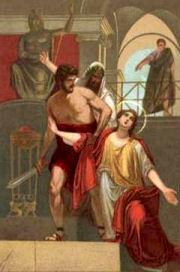Ordinary Time: August 29th
Memorial of the Passion of Saint John the Baptist
Old Calendar: Beheading of St. John the Baptist; St. Sabina, martyr
The Church, having celebrated the earthly birthday of St. John the Baptist on June 24, today honors the anniversary of his martyrdom. Besides our Lord and our Lady, St. John the Baptist is the only one whose birth and death are thus celebrated. Today's Gospel relates the circumstances of his execution. He had the courage to blame Herod to his face for the scandal of his illegal union with his sister-in-law Herodias, whose husband was still alive. Herodias contrived to make Herod imprison him and took advantage of an unexpected opportunity to obtain through her daughter Salome the beheading of the saint.
According to the 1962 Missal of St. John XXIII the Extraordinary Form of the Roman Rite, today is the feast of St. Sabina. The titular church of St. Sabina of the Aventine is a gem of Christian architecture. It owes its origin to the generosity of a Roman lady of the name of Sabina who gave to the Christian community the house that she possessed in this aristocratic quarter of Rome. The martyrologies also commemorate another St. Sabina who died in Umbria. The identity of name has caused confusion between the two women.
Martyrdom of John the Baptist In addition to the feast of the nativity of St. John the Baptist (June 24), the Church, since the fourth century, commemorates the martyrdom of Christ's precursor. According to the Roman Martyrology, this day marks "the second finding of his most venerable head." The body of the saint was buried in Samaria. In the year 362 pagans desecrated the grave and burned his remains. Only a small portion of his relics were able to be saved by monks and sent to St. Athanasius at Alexandria. The head of the saint is venerated at various places. That in the Church of St. Sylvester in Rome belongs to a martyr-priest John. Also in the Dominican church at Breslau the Baptist's head is honored.
In addition to the feast of the nativity of St. John the Baptist (June 24), the Church, since the fourth century, commemorates the martyrdom of Christ's precursor. According to the Roman Martyrology, this day marks "the second finding of his most venerable head." The body of the saint was buried in Samaria. In the year 362 pagans desecrated the grave and burned his remains. Only a small portion of his relics were able to be saved by monks and sent to St. Athanasius at Alexandria. The head of the saint is venerated at various places. That in the Church of St. Sylvester in Rome belongs to a martyr-priest John. Also in the Dominican church at Breslau the Baptist's head is honored.
Excerpted from The Church's Year of Grace, Pius Parsch
There is no doubt that blessed John suffered imprisonment and chains as a witness to our Redeemer, whose forerunner he was, and gave his life for him. His persecutor had demanded not that he should deny Christ, but only that he should keep silent about the truth. Nevertheless, he died for Christ. Does Christ not say: "I am the truth"? Therefore, because John shed his blood for the truth, he surely died for Christ.
Through his birth, preaching and baptizing, he bore witness to the coming birth, preaching and baptism of Christ, and by his own suffering he showed that Christ also would suffer.
Such was the quality and strength of the man who accepted the end of this present life by shedding his blood after the long imprisonment. He preached the freedom of heavenly peace, yet was thrown into irons by ungodly men. He was locked away in the darkness of prison, though he came bearing witness to the Light of life and deserved to be called a bright and shining lamp by that Light itself, which is Christ.
To endure temporal agonies for the sake of the truth was not a heavy burden for such men as John; rather it was easily borne and even desirable, for he knew eternal joy would be his reward.
Since death was ever near at hand, such men considered it a blessing to embrace it and thus gain the reward of eternal life by acknowledging Christ's name. Hence the apostle Paul rightly says: "You have been granted the privilege not only to believe in Christ but also to suffer for his sake." He tells us why it is Christ's gift that his chosen ones should suffer for him: "The sufferings of this present time are not worthy to be compared with the glory that is to be revealed in us."
— Saint Bede the Venerable
St. Sabina According to legend, Sabina was born in Vindena, Umbria, and became the wife of a notable person having the name Valentine. She was converted to the faith by her maid Serapia, a Christian virgin. When Serapia died a martyr's death (her feast occurs on September 3 in the Roman Martyrology), Sabina gave her servant's holy body an honorable burial. On that account she was cast into prison by Emperor Hadrian and brought before the judge Elpidius. "Are you Sabina, illustrious by family and marriage?" he asked. "Yes, I am," came the reply, "but I thank my Savior Jesus Christ that through His servant Serapia He has freed me from the power of hell." Due to her contempt of the gods, she was condemned to death. Christians buried her body in the same grave as her teacher in the faith.
According to legend, Sabina was born in Vindena, Umbria, and became the wife of a notable person having the name Valentine. She was converted to the faith by her maid Serapia, a Christian virgin. When Serapia died a martyr's death (her feast occurs on September 3 in the Roman Martyrology), Sabina gave her servant's holy body an honorable burial. On that account she was cast into prison by Emperor Hadrian and brought before the judge Elpidius. "Are you Sabina, illustrious by family and marriage?" he asked. "Yes, I am," came the reply, "but I thank my Savior Jesus Christ that through His servant Serapia He has freed me from the power of hell." Due to her contempt of the gods, she was condemned to death. Christians buried her body in the same grave as her teacher in the faith.
Excerpted from The Church's Year of Grace, Pius Parsch
